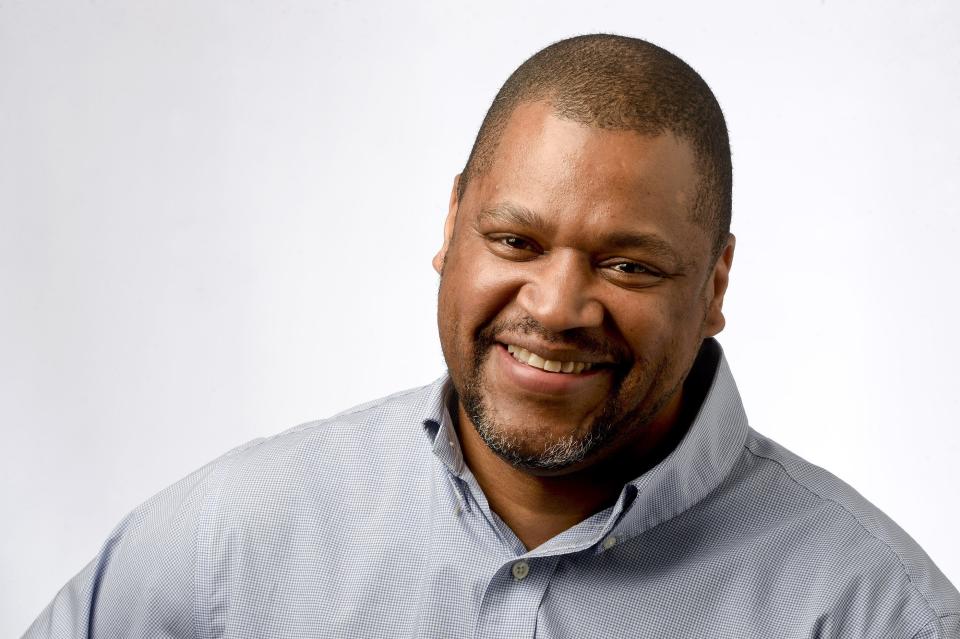Patrick Lyoya’s death in a Michigan police shooting shakes immigrants in Erie, nationwide
We sat down for a sorrowful interview at Harvest Family Church the morning of April 18.
Dieudonne Arahama, a refugee from the war-ravaged Democratic Republic of Congo who now lives in Erie, could not have been more gracious and introspective as he spoke to me through an interpreter about Patrick Lyoya's shooting death at the hands of police in Grand Rapids, Michigan, on April 4.
But during that interview it was evident that Arahama was also restless, troubled and in search of clarity.
The tragedy was personal for Arahama, a 51-year-old employee of a local plastics shop.
He is a lifelong friend of Peter Lyoya, Patrick’s father; Arahama and Peter Lyoya were raised together in the same village in the eastern portion of the Congo.
Both brought their families to the U.S. within the last decade to seek escape from armed conflict and violence. Arahama told me Peter Lyoya is “like a brother” to him and he considers Patrick Lyoya his nephew.
Patrick Lyoya shooting:Erie refugee mourns, asks for justice
That aligns with African culture, where the definition of family is often dynamic and can be more about frequent personal interactions and support than blood relations.
Arahama was struggling to understand why Patrick Lyoya had become the latest nationally-known, protest-spawning case of a Black man killed by a white police officer during a police encounter.
The shooting followed a brief foot chase between Lyoya and Grand Rapids Police Officer Christopher Schurr and a struggle over the officer's Taser; two autopsies have revealed that Lyoya was shot in the back of the head by the officer.
Grand Rapids police released video footage of the altercation from several angles/sources, including body-worn police cameras, an in-car video, a neighbor's doorbell video and cellphone video recorded by the passenger in Lyoya's car.
“What kind of trouble did he get into that caused them to kill him?” Arahama said.
“This death created fear,” Arahama continued. “You don’t even know what to say if you meet a police officer. You start to stutter. We heard of this kind of news in other communities, in other states. Now it’s happening to (refugees) firsthand. It feels different.”
Lyoya’s mother, Dorcas Lyoya expressed similar sentiments during an a recent interview with the Detroit Free Press.
USA TODAY:Black immigrants shocked by police shooting
"They told us that in America, there's peace, there's safety, you're not going to see killing anymore, that it was basically a safe haven," Dorcas Lyoya said.
Immigration advocates told USA Today recently that Lyoya's killing, and others like it, can fragment immigrants’ sense of security in America and their faith in the U.S. law enforcement system. Roughly 4.6 million Black people living in the U.S., or 1 in 10, are immigrants and that number is expected to double by 2060, according to the Pew Research Center. Further, according to the Migration Policy Institute, Africans are one of the fastest-growing segments of the American population via the diversity lottery program.
"It's shocking to Black migrants who have this vision of the United States as the land of the free and the home of the brave," Nana Gyamfi, executive director of the Black Alliance for Just Immigration, told USA Today. "There's a notion that police here are going to be different."
A friend of Lyoya’s, fellow Congolese refugee Jonathan Mukendi, told the Washington Post recently that he is more fearful of police in the wake of the shooting. Mukendi recalled that recently, he was pulled over by police in Allendale, Mich., and officers asked to look at his cellphone for proof he was going where he said he was.
He was afraid to quarrel with officers.
“What if I start arguing with him and there’s no camera, nobody there?” Mukendi said. “When it happens to one of your close people, you feel like, ‘Okay, this is real.’”
The Rev. Mlongeca Malongo, pastor of Harvest Family Church, 501 W. 31st St., also spoke with me via an interpreter.
His congregation includes Arahama's family and many of the several hundred Erie-area immigrants who are from African nations.
"Diversity initiatives are important. Police should come to our community (so) we can sit and talk with them," Malongo said. "As pastors, we teach that the life of a person is very important.
"We don't hate the police. We don't want to fear the police," Malongo said. "We should have that good communication with them, which is very important."
It has been widely reported since the shooting that Lyoya had been stopped by police for driving with a license plate that didn't belong to the vehicle, and that he had a criminal record. And that Lyoya’s blood alcohol level — when Schurr pulled over his vehicle — was more than three times the legal limit for driving.
Malongo acknowledged that Lyoya was troubled and “had his problems.
“I’m not here to defend Patrick,” Malongo said. “We know the truth is that Patrick had his wrongdoings. But even though he had some bad records, his records did not deserve the sentence of death.”
Contact Kevin Flowers at kflowers@timesnews.com. Follow him on Twitter at @ETNflowers.

This article originally appeared on Erie Times-News: Immigrants in Erie, U.S. rocked by Patrick Lyoya police shooting death

